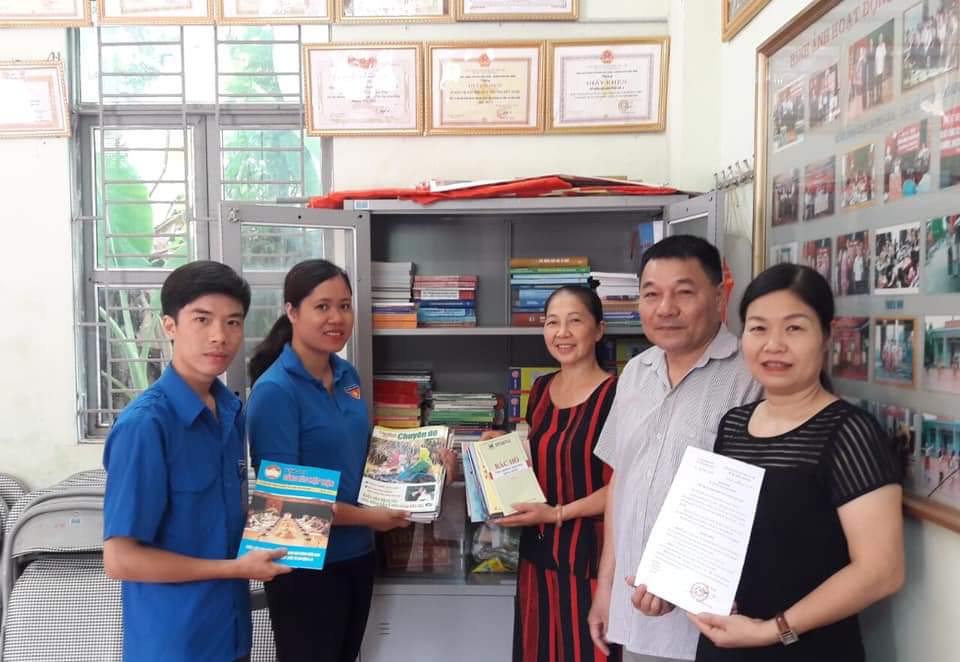
(HBO) - Over the past years, the culture, sports and tourism sector has made recommendations to the provincial administration in issuing directions, mechanisms and policies on the building of a healthy cultural environment, starting with the maintenance of the movement "All people unite in building a cultured lifestyle” in association with the new-style countryside and civilised city development.
 Staff of
the community-based learning centre and young people in Huu Nghi ward of Hoa
Binh city have collected books and newspapers for cultural centres of local
residential areas so as to encourage the reading habit.
Staff of
the community-based learning centre and young people in Huu Nghi ward of Hoa
Binh city have collected books and newspapers for cultural centres of local
residential areas so as to encourage the reading habit.All-level authorities and sectors have boosted communications
campaigns so as to promote people, civil servants and public employees’
awareness and effective implementation of activities to develop "cultured
families”, "cultured villages”, and "cultured agencies, units and businesses”.
District-level localities in Hoa Binh province
have paid heed to multiplying the models of cultured families, villages and
residential areas, stepping up the practice of a civilised lifestyle,
environmental protection and eradication of social crimes, and bringing into
play grassroots democracy. Some have developed such models as "self-managed
groups of families”, "self-managed alleys”, "self-managed streets”, and
"self-managed clans”. Besides, agencies, sectors and organisations have applied
codes of conduct to their cadres, civil servants, public employees, and staff.
As a result, the campaign of building cultured
families, villages, residential areas, and agencies has been expanding. In
2019, 83.8 percent of families across the province were recognised as "cultured
families” while 85.2 percent of villages and residential areas and 94 percent
of agencies and businesses met standards for cultured lifestyle.
To have a healthy society, building sustainable
and happy families which are the vital cell of society is also of critical
importance. So far, 1,657 clubs of "Developing sustainable families” in Hoa
Binh province have been set up, creating platforms for members to share
experience to help build progressive, happy, and sustainable families.
Additionally, the upholding of families and
clans’ fine traditions has also received due attention. In the movement of
developing "cultured families”, a number of exemplary families have been
honoured such as those of Nguyen Quang Canh in Dong Tam commune (Lac Thuy
district), Dinh Duc Ban in Hop Phong commune (Cao Phong district), Ly Sinh Toan
in Tu Son commune (Kim Boi district), and Bui Quang Ngoan in Mong Hoa commune
(Hoa Binh city).
To further improve people’s living standards,
authorities have also developed such facilities as cultural centres, sports
grounds, libraries, and equipment for joint activities which are hoped to
attract locals to healthy cultural activities and prevent toxic culture./.
With an increasingly vibrant and widespread emulation movement aimed at building cultured residential areas and cultured families, Yen Thuy District has been making steady progress toward improving both the material and spiritual well-being of its people, while fostering a civilized, prosperous, beautiful, and progressive community.
Once lacking recreational spaces and community facilities, Residential Group 2 in Quynh Lam Ward (Hoa Binh City) has recently received attention for the construction of a new, spacious, and fully equipped cultural house. The project followed the model of state support combined with public contributions in both labor and funding.
The "All people unite to build cultural life" movement, which has been effectively integrated with Kim Boi district’s socio-economic development goals, is fostering a lively spirit of emulation across local residential areas, hamlets, villages, public agencies, and enterprises. In addition, through the initiative, traditional cultural values are being preserved and promoted, while community solidarity and mutual support in poverty reduction and economic development are being strengthened.
A working delegation of the Hoa Binh provincial People’s Committee led by its Permanent Vice Chairman Nguyen Van Toan on June 11 inspected the progress of a project to build the Mo Muong Cultural Heritage Conservation Space linked to tourism services in Hop Phong commune, Cao Phong district.
Born and growing in the heroic land of Muong Dong, Dinh Thi Kieu Dung, a resident in Bo town of Kim Boi district, in her childhood was nurtured by the sweet lullabies of her grandmother and mother. These melodies deeply imprinted on her soul, becoming an inseparable part of her love for her ethnic group's culture. For over 20 years, this love for her hometown has driven Dung to research, collect, and pass down the cultural values of the Muong people to future generations.
In the final days of May, the Ethnic Art Troupe of Hoa Binh Province organized performances to serve the people in remote, mountainous, and particularly disadvantaged areas within the province. These were not just ordinary artistic shows, but they were the meaningful journeys aimed at spreading cultural values, enhancing the spiritual life of the people and contributing to the preservation of ethnic minority cultural identities.



 Staff of
the community-based learning centre and young people in Huu Nghi ward of Hoa
Binh city have collected books and newspapers for cultural centres of local
residential areas so as to encourage the reading habit.
Staff of
the community-based learning centre and young people in Huu Nghi ward of Hoa
Binh city have collected books and newspapers for cultural centres of local
residential areas so as to encourage the reading habit.